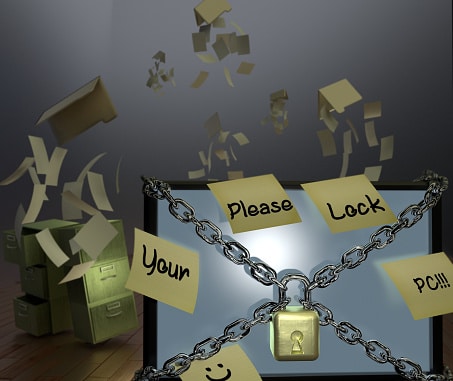Today’s small business owners are tasked with managing operations, employees and a wide range of things pertaining to the modern day business. It’s no surprise, then, that amid the hustle and bustle, some areas of importance are thrown to the wayside. Cybersecurity is often one of them.

According to studies, the majority of small business owners don’t believe their businesses are at risk of a cyber attack. This mindset is dangerous for business owners because they will not be prepared for a cyber-attack. In the event of an attack, it can wreak havoc on a small business that hasn’t yet armed itself with proper security protocols.
According to the Ponemon Institute, cyber-attacks cost small and medium-sized businesses an average of $2,235,000 in 2017. In order for small businesses to form a strong line of defense against cyber attacks, they’ll first need to evaluate their risk, and what’s at stake. Here are a few things small businesses should consider when preparing to amp up their data security.
Securing Your Data
Implementing solid data security for your business is a complex task that requires manpower. And although it can present quite the conundrum for small business owners, it’s something that, according to the FCC, must be done.
First, you’ll need to evaluate your current system. Which data do you actually need? While keeping customer data is important, it’s just as important to only ask for customer information that will actually be utilized. For instance, don’t ask for a social security number if you don’t need it.
The same notion applies for how long to keep this data. Don’t store your customers’ data longer than needed. The longer you keep it, the longer you are liable in the case of a data breach. And if you don’t have a retention policy in place, it’s time to implement one. Don’t forget that hand-in-hand with a retention policy is a process for how to delete the data. Do keep this in mind.
Strengthening Your Passwords
Implementing a strong password policy can make all the difference in keeping your data protected. Complex, unique passwords are paramount to data security, but how can you be sure those you’re using are really up to par?
You may want to look to the NIST for a list of digital identity guidelines that can help clarify what you should and shouldn’t be doing when setting new passwords. From two-factor authentication to the inclusion of symbols and capital letters, there are plenty of ways to strengthen your passwords to minimize the risk of an attack.
Establishing Network Segmentation
While, yes, one of the main goals of a small business should be to have a reliable network set up for operations, there’s a lot more to be done to ensure adequate data security. If your office frequently has customers traveling through your space, it’s best to implement a separate network that will prevent access to your data by just anyone. Doing this both minimizes the impact on your employees’ network and keeps internal data safe.
Don’t Ignore Updates
A constant bombardment of update notifications is annoying, and can even hinder productivity. And although it’s tempting to ignore these and push on with your work, updates are important in keeping your systems working properly. This is why it’s so important to stop ignoring them. In fact, small businesses should adopt a policy for updates and scheduled maintenance to ensure things aren’t falling through the cracks. A service provider can help you keep all your devices inline with the most current standards, and ensure updates are carried out accurately and within the proper timeframe.
Training For Success
If your business is one that employs mobile workers, data security becomes a bit more complicated. You’ll need to ensure these mobile workers’ devices are as secure as those within your office. Keep in mind that deleting company information in the event of a lost or stolen device is crucial.
A company may have the very best security in place to protect their data, but all it takes is one employee incident to destroy the reputation you’ve built. If your company’s salespeople do not require access to secured customer ddatabases don’t authorize them to use it. Giving access to crucial data only when it’s needed can help you minimize the chance of a cyber-attack.
You may be doing a fantastic job at training your employees for proper data security, but human error will always be an issue. This is not something you can prevent entirely, but you can teach your employees what to look out for. You can also help them understand the negative consequences associated with data breaches and the true impact of failing to be alert.
Data security for your small business is definitely not something you want to ignore. As an entrepreneur, you are likely both excited and weary of what’s to come. Don’t let a data breach put an end your empire before it starts.

 Mon-Fri 8 AM to 6 PM Mountain
Mon-Fri 8 AM to 6 PM Mountain 888-686-3025
888-686-3025



